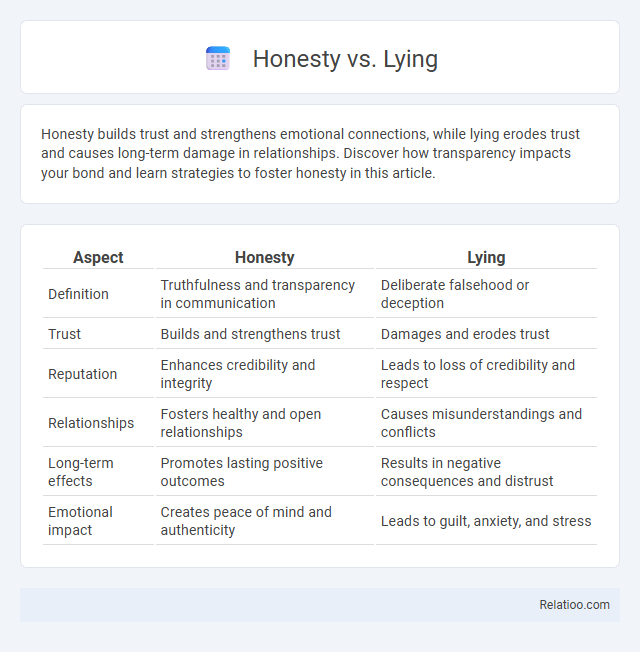Honesty builds trust and strengthens emotional connections, while lying erodes trust and causes long-term damage in relationships. Discover how transparency impacts your bond and learn strategies to foster honesty in this article.
Table of Comparison
| Aspect | Honesty | Lying |
|---|---|---|
| Definition | Truthfulness and transparency in communication | Deliberate falsehood or deception |
| Trust | Builds and strengthens trust | Damages and erodes trust |
| Reputation | Enhances credibility and integrity | Leads to loss of credibility and respect |
| Relationships | Fosters healthy and open relationships | Causes misunderstandings and conflicts |
| Long-term effects | Promotes lasting positive outcomes | Results in negative consequences and distrust |
| Emotional impact | Creates peace of mind and authenticity | Leads to guilt, anxiety, and stress |
Understanding Honesty: Definition and Importance
Honesty is the practice of being truthful, transparent, and sincere in words and actions, which fosters trust and integrity in interpersonal relationships. Understanding honesty involves recognizing its role in building credibility and promoting ethical behavior, contrasting sharply with lying, which undermines trust and creates conflict. The duality between honesty and lying highlights the moral and psychological complexities individuals face when choosing between truthfulness and deception.
The Psychology Behind Lying
Lying involves complex psychological mechanisms where individuals balance self-preservation and social acceptance, often leading to cognitive dissonance and emotional stress. The duality of human nature manifests in the conflict between honesty, which fosters trust and authenticity, and lying, which can serve as a defense mechanism or a manipulative tool. Research in psychology highlights how frequent dishonesty can alter brain function, particularly in areas related to empathy and moral reasoning.
Types of Lies: From White Lies to Deception
Types of lies range from harmless white lies, which aim to protect feelings or maintain social harmony, to more harmful deceptions designed to manipulate or conceal truth. White lies often involve minor falsehoods told to avoid unnecessary conflict, while more severe lies include omission, exaggeration, and outright fabrication with intentions to deceive. Understanding the duality of honesty versus lying reveals the complex moral and social implications behind each type of falsehood.
Consequences of Honesty in Personal Relationships
Honesty in personal relationships fosters trust, strengthens emotional bonds, and promotes effective communication, creating a foundation for lasting connections. While truthful transparency can occasionally lead to discomfort or conflict, the long-term benefits include increased intimacy and mutual respect. Conversely, lying erodes trust, damages credibility, and often results in emotional distance, highlighting honesty as essential for relational health and resilience.
The Impact of Lying on Trust and Reputation
Lying undermines trust by creating doubts about your reliability and integrity, which can severely damage both personal and professional relationships. Reputation suffers as dishonesty erodes credibility, leading others to question your motives and truthfulness. Maintaining honesty is essential to preserving trust and building a strong, positive reputation over time.
Cultural Perspectives on Truth and Falsehood
Cultural perspectives on honesty, lying, and duality reveal diverse interpretations of truth and falsehood, where some societies prioritize direct honesty as a moral imperative while others accept lying as a social tool for harmony or protection. In Confucian traditions, maintaining social harmony often justifies benevolent lies, contrasting with Western emphasis on individual integrity and transparent truth-telling. Duality in truth reflects how cultural contexts shape whether truth is absolute or situational, influencing ethical norms and interpersonal communication across global communities.
When Is Lying Justifiable? Ethical Dilemmas
Lying becomes justifiable when it protects someone's well-being or prevents harm, creating complex ethical dilemmas where honesty conflicts with compassion. Your decision to lie or tell the truth depends on the context, intention, and potential consequences, reflecting the duality of moral principles. Understanding this balance is crucial for navigating situations where integrity and empathy intersect.
Honesty in the Workplace: Benefits and Challenges
Honesty in the workplace fosters trust, improves communication, and enhances team collaboration, leading to increased productivity and employee satisfaction. Despite its benefits, maintaining honesty can present challenges such as managing sensitivity, building resilience to criticism, and navigating complex interpersonal dynamics. Cultivating a culture of transparency requires consistent leadership commitment and clear policies to balance openness with professionalism.
Strategies to Cultivate Honesty in Everyday Life
Cultivating honesty in everyday life requires intentional strategies such as self-reflection, transparent communication, and setting clear personal values that prioritize truthfulness. Practicing mindfulness helps you recognize moments of temptation to lie and redirect your response toward honesty, reinforcing integrity over duality. Consistently choosing honesty builds trust, enhances relationships, and strengthens your moral framework, making authenticity a foundational habit.
Building a Truthful Society: Steps Forward
Fostering a truthful society requires prioritizing honesty as a fundamental value while addressing the complexities of lying and duality in human behavior. Implementing educational programs that emphasize ethical communication, critical thinking, and emotional intelligence can reduce deceptive practices and promote transparency. Encouraging open dialogue and accountability within communities creates an environment where trust thrives, laying the groundwork for integrity-driven social systems.

Infographic: Honesty vs Lying
 relatioo.com
relatioo.com